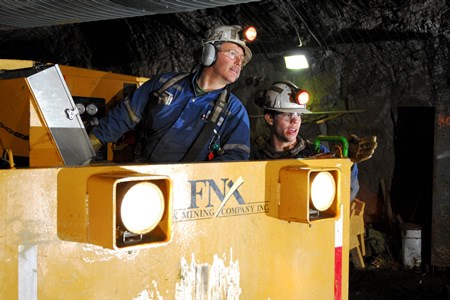Northern Ontario suppliers will see stronger opportunities both at home and abroad as a result of the merger between FNX Mining Company Inc. and Quadra Mining Ltd., according to Vern Baker, vice- president of FNX’s Sudbury operations.
Among those is the potential to access the new company's projects in Arizona, Nevada and even Chile, the location of the Sierra Gorda project. With the potential to produce 400-million pounds of copper per year, Sierra Gorda will see at least $2.3 billion in capital spending over the next four years to prepare it for production.
Speaking to a packed room of Sudbury Area Mining Supply and Service Association members at the local Howard Johnson on April 27, Baker highlighted how regional companies can potentially participate in these and other activities.
The new company will not take a “global purchasing” approach, but will instead involve purchasers from various sites collaborating to solve problems, something that may benefit Sudbury suppliers who assist with specific site solutions, said Baker.
“As we will work with people in Arizona, Nevada and Chile and hopefully other provinces and states, we say ‘We solved this problem working with this individual,’” said Baker of the new company, which will be focused largely on copper production.
“That’s where I see doors really get opened for creative and dynamic suppliers.”
This is on top of the “considerable” work the company expects to see in the Sudbury basin this year, including a 30 per cent increase in annual production through 2010 over the previous year, with 891,000 tons. This number could grow further if nickel production is brought back online, something that may occur if prices become favorable, he said.
In the first quarter of 2010, FNX spent 77 per cent – $14 million – of its contracting and supply dollars on local companies, and is projected to spend $85 million through the rest of the year.
The capital budget for 2010 sits at roughly $100 million, including $75 million in operations, $13 million in exploration of its mines, and $16 million for additional exploration.
The completed merger between FNX and Quadra will strengthen the company’s ability to pursue bigger and better things, even within the Sudbury basin, said Baker.
While FNX has a market capitalization of $1.5 billion, the larger company’s market capitalization of $3.5 billion will allow for a much more aggressive acquisition of new projects, companies and expansion of its existing mines.
This includes the possibility of tripling production over the next three years, while looking at the potential to bring its new Victoria property into production.
“All those opportunities here in Sudbury, all the ones that FNX has their finger in, we still have all those opportunities once we make this merger,” said Baker. “But we’ll have a bigger and stronger company behind us to help us take advantage of them, and that’s why those move.”
As the company continues to grow, so too will its purchasing needs, said Milferd Burnett, purchasing manager with FNX. He outlined the list of factors the company’s bid committee examines when attempting to make a decision on which bid to select, including the bidding company’s safety record, price, delivery or completion date, quality, past performance, and references. Some of these factors may weigh more heavily than others, depending on circumstance.
“There are times where the delivery or completion date is weighted a lot heavier than the price, and that’s very dependent on what the production requirements are,” said Burnett. “We’ve had cases where we’ve selected the highest-priced bid because it came in with a better delivery or completion date, and therefore improved our productivity in certain areas.”
This is important to know as the company approaches the expiry dates for some of its current contracts, he says. This year, bucket contracts will expire July 31 while tank inspections will expire December 31.
In 2011, November will mark the expiration of contracts for screens, ground supports, safety supplies and pipes, while bulk cement will expire in December.
Upcoming tenders will include tires, drill parts, electrical cable and general consumables, among others.




